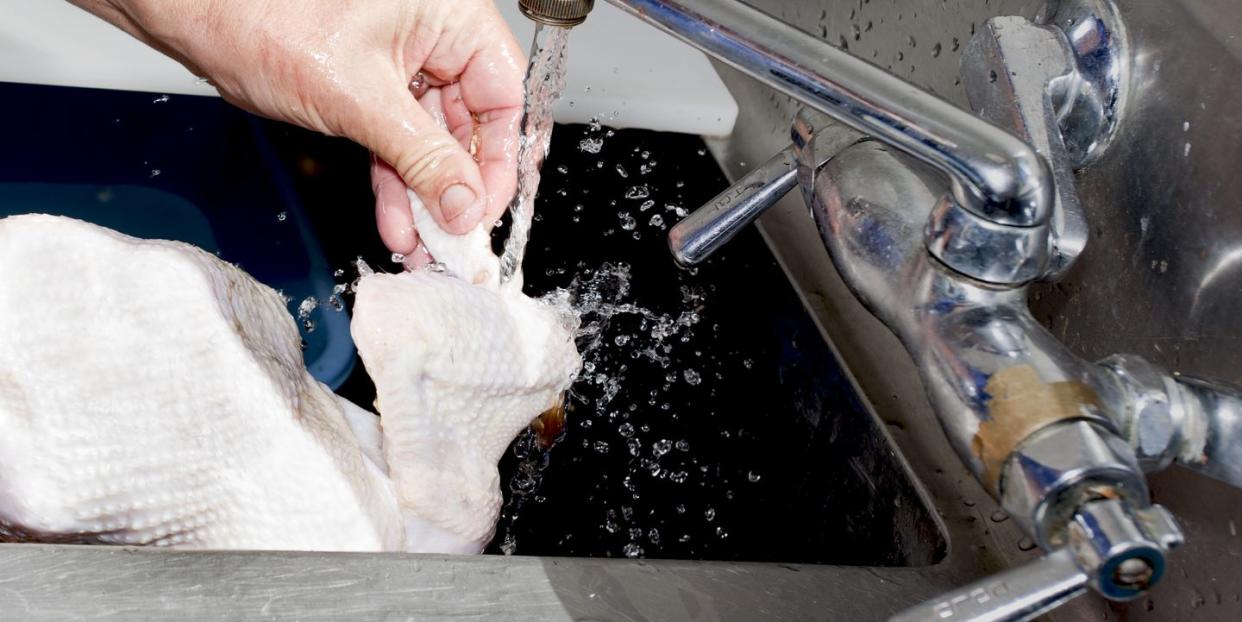Should You Wash Raw Chicken Before You Cook It?

Washing raw chicken has been found to put you at risk for food-borne illness.
A recent study from the U.S. Department of Agriculture found that a majority of consumers who are not given safe-handling information wash their chicken first.
Before you dice up those tomatoes for a salad or slice some zucchini for a stir-fry, chances are, you give them a good wash first: Rinsing your produce helps reduce the chances you can get sick from bacteria on it.
So, if washing your produce is healthy, same applies for chicken...right?
Nope. Rinsing chicken before cooking it can actually increase the chances of cross-contamination, which can make you sick—but a surprisingly high percentage of people are still washing their birds first, a recent study from the U.S. Department of Agriculture found.
In the study, researchers broke up group of 300 people into two groups. The first group received safe handling tips for raw poultry, while the second group did not. Then, researchers observed their chicken-handling procedures.
They found that of the people given safety tips, 93 percent did not wash their chicken. But 61 percent of the group who did not receive best-practices advice washed their poultry first.
Participants who washed their chicken rinsed it in the sink, and reported doing so to remove blood and/or slime, or that they did it simply because that’s what they observed a family member doing.
“Some consumers believe that washing and rinsing chicken is an act of improving the chicken,” Abby Snyder, Ph.D., assistant professor of microbial food safety, in the department of food science at Cornell University tells Runner’s World. “Washing raw chicken isn’t how consumers mitigate risk; cooking the chicken is how you eliminate pathogens.”
Not only that, but simply rinsing the chicken wouldn’t be enough to remove all risk of contamination—chicken should be cooked to a safe internal temperature of 165°F to negate risk of food-borne illness, according to the Centers for Disease Control and Prevention..
[Find 52 weeks of tips and motivation, with space to fill in your mileage and favorite routes, with the Bicycling Training Journal.]
Not only does washing raw chicken not remove the harmful bacteria, but it actually poses greater danger for cross-contamination, when pathogens move from one source to another.
“In this case, we are talking about pathogens like Salmonella getting transferred to cutting boards, knives, and even other food,” Snyder explains.
Think of it like this: When the spray of water hits the chicken, it can take some of the bacteria from its surface with it. Then, that spray of water can hit the sink, where it can be transferred to anything you put in there, like utensils or cutting boards, or the spray can land on other items directly—including other food you are preparing, like veggies for your salad.
This puts you at risk for things like Salmonella and Campylobacter, a food-borne illness that comes from raw poultry, says Snyder. Both illnesses can cause cramping, fever, and diarrhea.
“Washing or rinsing raw meat and poultry can increase your risk as bacteria spreads around your kitchen, but not washing your hands for 20 seconds immediately after handling those raw foods is just as dangerous,” Carmen Rottenberg, administrator of USDA’s Food Safety and Inspection Service (FSIS), said in a statement.
Additionally, the USDA recommends washing and handling any foods, like lettuce or raw veggies, that won’t be cooked before preparing raw poultry, sanitizing any surface that has been contaminated by raw meat, and practicing proper handwashing—lather with soap and then scrub your hands for 20 seconds.
You Might Also Like
